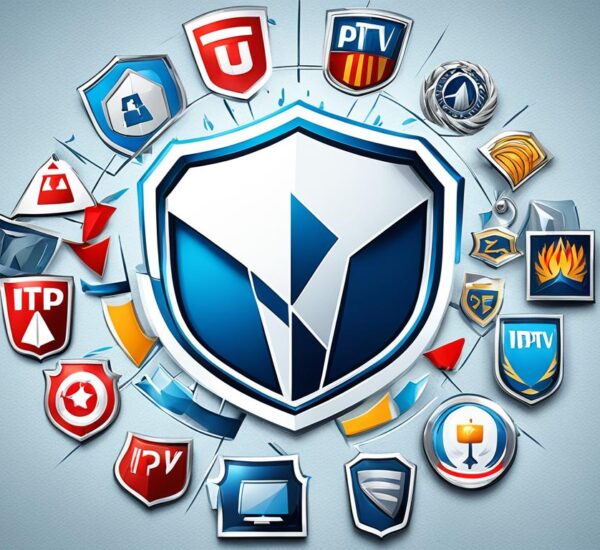Did you know that cyber threats caused nearly $6 trillion in damage globally in 2022? With the increasing popularity of IPTV (Internet Protocol Television), ensuring the security of your IPTV service has become crucial. Protecting against IPTV cybersecurity risks is essential to safeguard your platform, content, and customer data. In this article, we will explore the top cybersecurity essentials for safe streaming to help you maintain a secure and reliable IPTV service.
Key Takeaways:
- Implement layered security measures for server-side protection.
- Choose an IPTV provider that supports SSL/TLS encryption for secure content transmission.
- Utilize identity and access management to prevent unauthorized access to your IPTV platform.
- Deploy multi-DRM security to protect against piracy and unauthorized content distribution.
- Utilize watermarking and screen record protection to deter unauthorized sharing of your IPTV videos.
Importance of Server-Side Security
When it comes to IPTV network security, server-side security plays a vital role in safeguarding your customer data and resources. It is crucial to implement robust security measures to protect against cyber threats and malicious network traffic. By ensuring comprehensive server-side security, you can provide a safe and secure streaming experience for your viewers.
To enhance server-side security, it is recommended to adopt layered security measures, such as a multi-level firewall. This helps to create multiple barriers and effectively block unauthorized access attempts. Additionally, consider choosing an IPTV platform provider that offers regular scans, penetration testing, and security audits. These proactive measures help identify vulnerabilities and ensure that your system remains protected against emerging threats.
Round-the-clock monitoring is another essential aspect of server-side security. By leveraging advanced monitoring solutions, you can actively detect any suspicious activities and promptly respond to potential security breaches. Disaster recovery mechanisms should also be in place to minimize downtime and quickly restore services in case of system failures or cyber attacks.
To further fortify your server against Distributed Denial of Service (DDoS) attacks, it is important to implement DDoS protection solutions. These solutions help mitigate the impact of DDoS attacks by filtering out malicious traffic and maintaining the availability of your IPTV service even during high-demand periods.
Cybersecurity Solutions for IPTV
Implementing the right cybersecurity solutions for your IPTV network security is crucial to protect your service and ensure the safety of your viewers’ data. Consider the following solutions:
- Multi-level firewall: Deploy a multi-level firewall system to create multiple defense layers against cyber threats.
- Regular scans and testing: Conduct regular vulnerability scans, penetration testing, and security audits to identify potential weaknesses and address them proactively.
- Round-the-clock monitoring: Utilize advanced monitoring solutions to detect and respond to security incidents promptly.
- Disaster recovery mechanisms: Have robust disaster recovery mechanisms in place to minimize downtime and ensure the continuity of your IPTV service.
- DDoS protection: Invest in DDoS protection solutions to mitigate the impact of DDoS attacks and maintain the availability of your service.
By prioritizing server-side security and implementing the right cybersecurity solutions, you can establish a robust defense against cyber threats and provide your viewers with a secure and uninterrupted streaming experience.
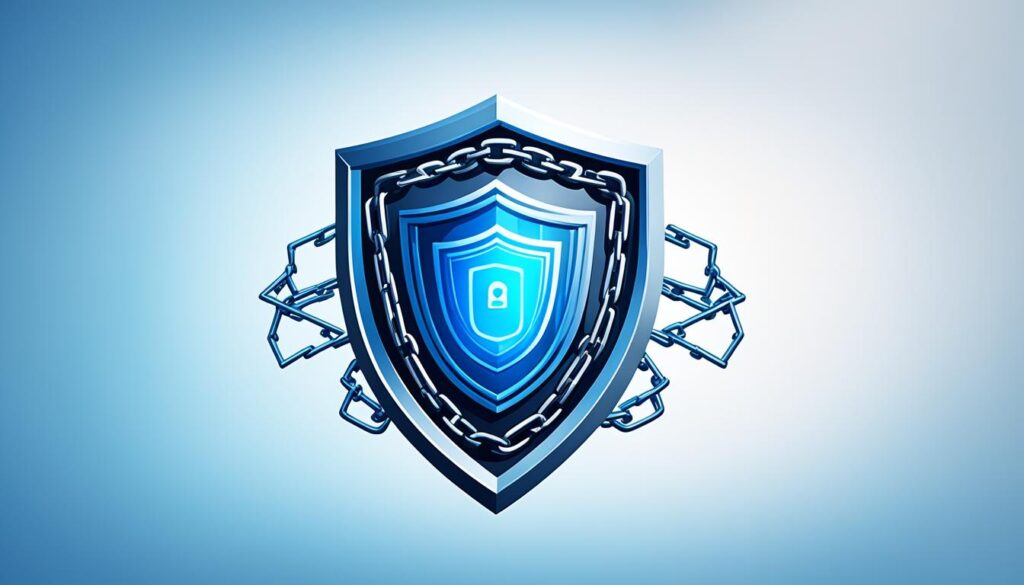
SSL/TLS Encrypted Paywall
In order to enhance the security of your IPTV service, implementing an SSL/TLS encrypted paywall is essential. By utilizing these encryption protocols, you can ensure that live streams from your servers to clients are transmitted securely. The SSL and TLS protocols provide end-to-end security and safeguard against unauthorized access during transmission, thereby protecting the privacy and security of your IPTV content.
When selecting a provider for your IPTV service, it is crucial to choose one that supports SSL/TLS encryption. This will ensure that your content remains secure and protected from any potential privacy breaches. With an SSL/TLS encrypted paywall, you can have peace of mind knowing that your IPTV content is securely delivered to your viewers.
In addition to deploying an SSL/TLS encrypted paywall, there are other cybersecurity measures you can employ to fortify your IPTV service. These include server-side security, identity and access management, multi-DRM security, watermarking, and screen record protection. By implementing a comprehensive set of security measures, you can ensure the safety and integrity of your IPTV platform, protecting it from cyber threats and providing your viewers with a secure streaming experience.
Identity and Access Management
In the realm of IPTV network security, identity and access management (IAM) plays a crucial role in safeguarding your streaming platform. By implementing robust IAM strategies, you can effectively prevent unauthorized access to your IPTV service, ensuring secure and reliable content delivery.
One key aspect of IAM is the implementation of single sign-on (SSO) authentication. With SSO, customers can access multiple applications and websites using a single set of login credentials, simplifying the user experience and enhancing security. By consolidating authentication processes, you minimize the risk of credential exposure and improve overall network security.
Additionally, IAM allows you to limit access to authenticated users. By granting access privileges only to authorized individuals, you can protect against unauthorized viewing and potential security breaches. By controlling and monitoring user access permissions, you maintain a strong defense against malicious actors seeking to exploit your IPTV platform.
Furthermore, IAM provides you with the ability to implement role-based access control (RBAC), assigning specific roles and permissions to different user groups. With RBAC, you ensure that users only have access to the resources and functionalities relevant to their roles, reducing the likelihood of unauthorized actions and potential vulnerabilities.
Benefits of Implementing IAM for Secure IPTV Services:
- Enhanced security: IAM strengthens your IPTV network security by controlling access, reducing the risk of unauthorized viewing, and protecting against potential cyber threats.
- Improved user experience: SSO authentication simplifies the user login process, enhancing convenience and streamlining access to your IPTV service.
- Efficient access management: IAM allows for streamlined control over user access, enabling you to assign appropriate roles and permissions to different user groups.
- Compliance readiness: Implementing IAM measures ensures that you adhere to industry regulations and data protection requirements, safeguarding the privacy and security of user information.
In conclusion, identity and access management is an essential component of secure IPTV services. By implementing SSO authentication, limiting access to authenticated users, and leveraging RBAC, you can enhance the security of your IPTV platform, protect against cyber threats, and provide a seamless user experience.
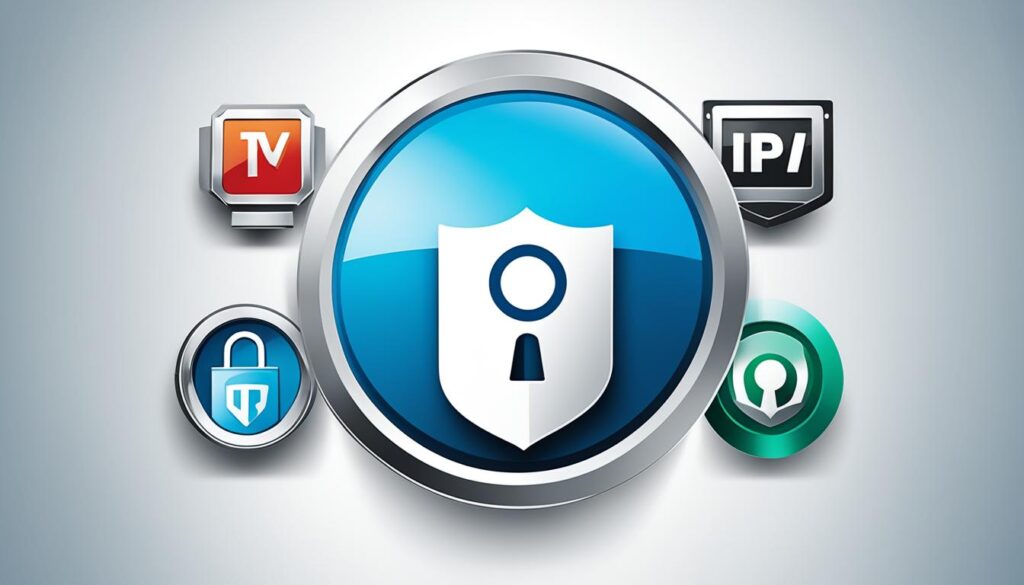
Multi-DRM Security
Protecting copyrights and ensuring secure live streaming is essential in the world of IPTV. That’s where Digital Rights Management (DRM) comes into play. By implementing multi-DRM security measures, you can safeguard your valuable content from hackers and infringement.
When choosing an IPTV platform provider, it is crucial to select one that offers a comprehensive range of DRM solutions. Popular DRM services like Playready, Fairplay, Widevine, and Marlin are highly recommended for their effectiveness in protecting your IPTV content.
Implementing multi-DRM security provides layers of encryption and authentication to ensure that only authorized users can access and enjoy your content. By employing these robust security measures, you can confidently stream your IPTV content, knowing it is protected against unauthorized access and potential breaches.
With multi-DRM security in place, you can rest assured that your IPTV content remains secure and your copyrights are protected.
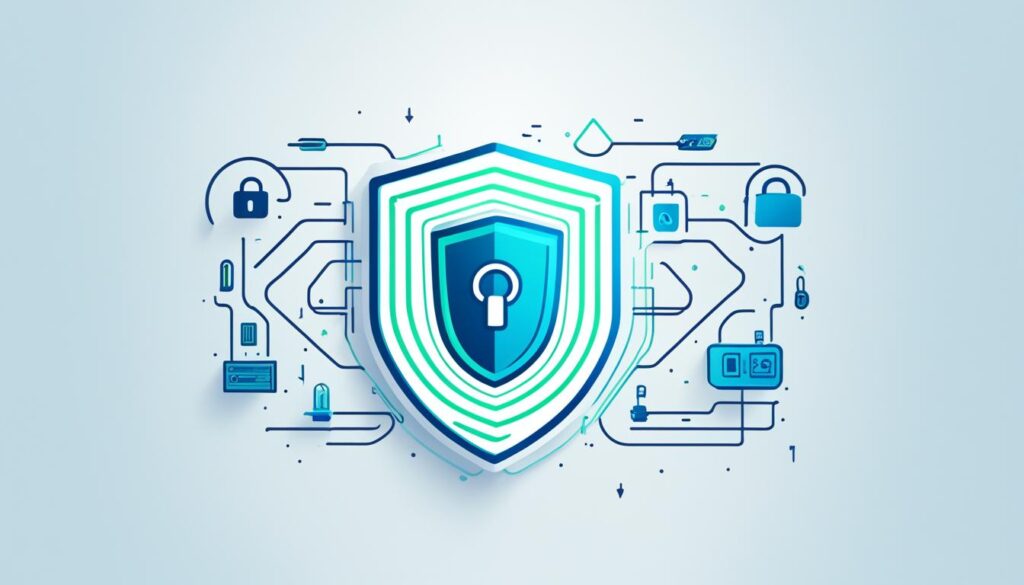
Comparison of DRM Solutions
| DRM Solution | Features | Supported Platforms |
|---|---|---|
| Playready | Robust encryption, license verification, content protection | Windows, Xbox, Android, iOS |
| Fairplay | Authentication, content encryption, dynamic license management | Apple devices, Safari browser |
| Widevine | Modular architecture, hardware-based protection, adaptive streaming | Android devices, Chrome browser |
| Marlin | Cross-platform support, scalable security management, content protection | Various platforms |
Watermarking and Screen Record Protection
Watermarking and screen record protection are crucial security measures for safeguarding your IPTV videos and preventing unauthorized sharing and access. These protective features ensure that your valuable content remains protected and discourages piracy and unauthorized distribution.
Screen Record Protection:
Screen record protection is a powerful tool that disables the option to capture live streaming content. By implementing screen record protection, you can prevent users from easily recording your streams, ensuring the integrity and exclusivity of your content.
Watermarking:
Watermarking allows you to add personalized information to your streams, such as customer names or email addresses. This digitally embedded information acts as a deterrent to unauthorized sharing as it can be used to identify the source of leaked or pirated content. With watermarking in place, potential infringers are less likely to distribute unauthorized copies of your IPTV videos.
By utilizing both screen record protection and watermarking, you can significantly enhance the security of your IPTV service. These measures help protect your content from unauthorized distribution, safeguard your revenue, and maintain the exclusivity of your offerings for legitimate viewers.
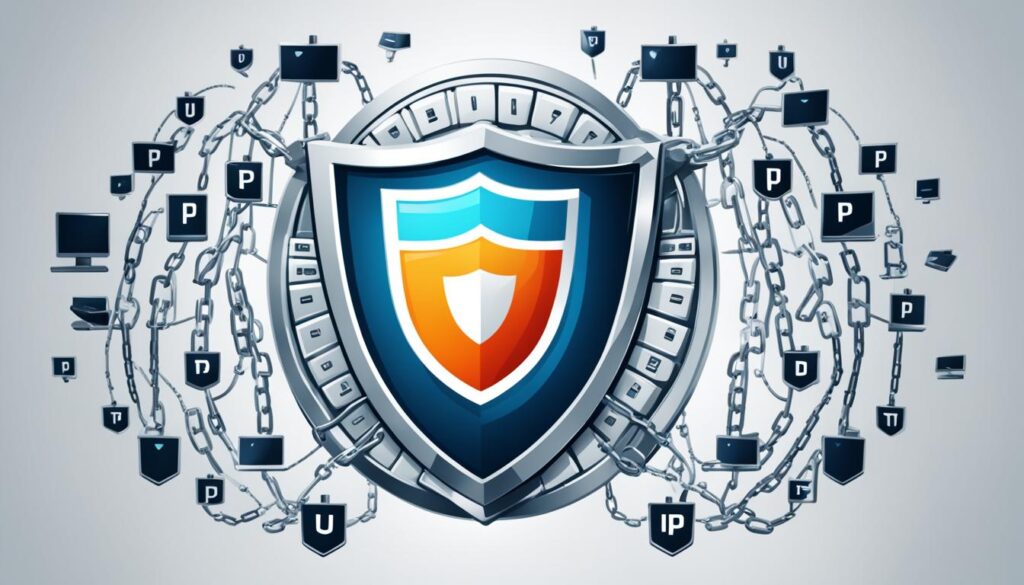
Importance of Secure IPTV Service Providers
When it comes to IPTV streaming, the safety and security of your platform should be a top priority. Choosing a secure IPTV service provider can significantly enhance your network security and protect your content from cyber threats. But how do you know which provider to trust? Look for the following comprehensive security features when selecting your IPTV service provider:
SSL Certificates
Secure Sockets Layer (SSL) certificates provide encryption for data transmitted between servers and clients, ensuring the privacy and integrity of your IPTV streams. By using an IPTV service provider that offers SSL certificates, you can safeguard against unauthorized access and protect sensitive customer information.
Screen Record Protection
Screen record protection is a crucial security feature for preventing unauthorized capturing of your IPTV content. It disables the ability to record live streaming, ensuring that your content is only accessible through authorized channels. When evaluating IPTV service providers, inquire about their screen record protection capabilities to protect your content from piracy and unauthorized distribution.
Watermarking
Watermarking allows you to embed unique customer information, such as their name or email address, into your IPTV streams. This serves as an effective deterrent against unauthorized sharing and provides traceability in case of content infringement. Choose an IPTV service provider that supports watermarking to enhance the security and protect the integrity of your content.
PCI Compliance
Payment Card Industry (PCI) compliance is essential if your IPTV service involves accepting online payments. By partnering with a PCI-compliant IPTV service provider, you ensure the secure handling and transmission of customer payment card data, reducing the risk of data breaches or financial fraud.
Multi-DRM
Digital Rights Management (DRM) is crucial for protecting your content from unauthorized access and piracy. Look for an IPTV service provider that offers multi-DRM security, supporting popular DRM solutions like Playready, Fairplay, Widevine, and Marlin. This comprehensive approach to DRM will provide robust security for your IPTV content.
Server-Side Security
Server-side security is a critical aspect of protecting your IPTV service from cyber threats. Ensure that your IPTV service provider implements robust security measures, such as multi-level firewalls, regular security scans, penetration testing, disaster recovery solutions, and DDoS protection. These measures will enhance the security and resilience of your IPTV network.
Geoblocking and VPN Detection
Geoblocking and VPN detection are essential features for preventing unauthorized access to your IPTV service. Geoblocking restricts access based on the geographic location of users, ensuring compliance with content licensing agreements. VPN detection helps identify and block users who attempt to access your content through virtual private networks, enhancing the overall security of your IPTV platform.
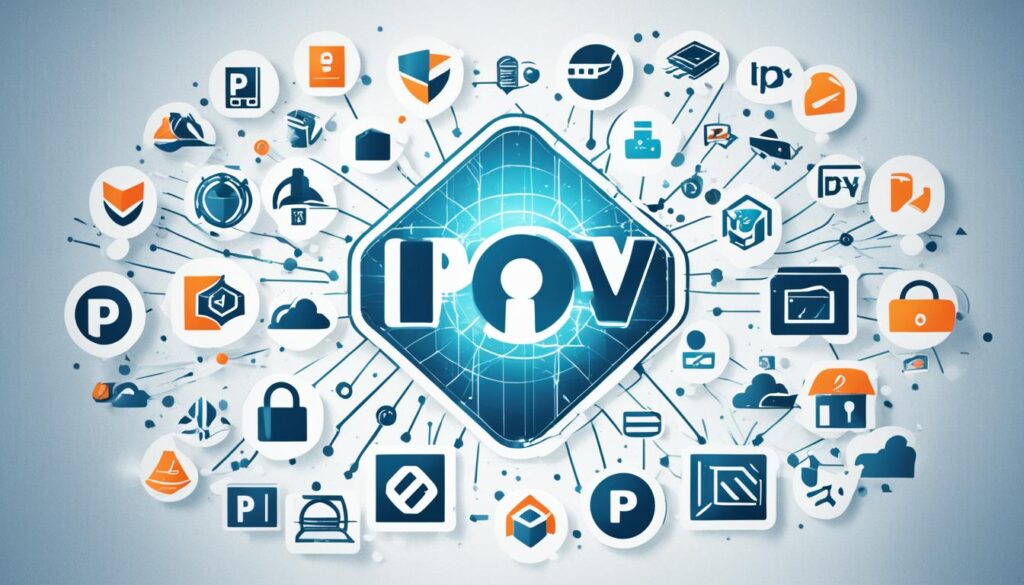
| Security Feature | Description |
|---|---|
| SSL Certificates | Ensure secure transmission of data between servers and clients, protecting against unauthorized access. |
| Screen Record Protection | Prevent unauthorized capturing and distribution of your IPTV content. |
| Watermarking | Add unique customer information to your streams for traceability and deter unauthorized sharing. |
| PCI Compliance | Securely handle and transmit customer payment card data to reduce the risk of data breaches. |
| Multi-DRM | Protect your content from unauthorized access and piracy using industry-leading DRM solutions. |
| Server-Side Security | Implement robust server-side security measures like firewalls, security scans, and DDoS protection to safeguard your IPTV network. |
| Geoblocking and VPN Detection | Restrict access based on geographic location and detect and block users attempting to access your content using VPNs. |
Secure Your Content Sources and Delivery
Fortifying the content delivery pipeline is essential for maintaining a secure IPTV service. By implementing the following measures, you can ensure the protection of your IPTV content:
1. Contractually Mandate Upstream Sources to Encode and Encrypt Feeds
Require all upstream sources to encode and encrypt their feeds before delivering them to your platform. This ensures that the content remains protected during transmission and prevents unauthorized interception. By establishing these contractual obligations, you strengthen the security of your IPTV content from the very source.
2. Utilize Secure FTP for Receiving Linear Feeds
When receiving linear feeds, it is crucial to utilize secure file transfer protocols (FTP) to safeguard the content. Secure FTP encrypts the data while being transferred, preventing unauthorized access and tampering. By implementing secure FTP, you can ensure the privacy and integrity of your IPTV feeds.
3. Integrate DRM Protocols for Video Stream Encryption
Implementing Digital Rights Management (DRM) protocols is vital for encrypting your video streams and protecting them from piracy. By utilizing DRM solutions such as Playready, Fairplay, Widevine, and Marlin, you can prevent unauthorized access to your content and ensure that only authorized viewers can enjoy your IPTV services.
4. Employ Hardened IPTV Delivery Networks or CDNs
Utilizing hardened IPTV delivery networks or content delivery networks (CDNs) that automatically encrypt streaming content adds an additional layer of protection. These networks provide secure delivery of your content, ensuring that it cannot be compromised during transmission. By partnering with a secure CDN provider, you can enhance the overall security of your IPTV service.
Securing your content sources and delivery is crucial for maintaining the integrity and privacy of your IPTV service. By implementing contractual agreements for encoding and encrypting feeds, utilizing secure FTP protocols, integrating DRM solutions, and partnering with secure CDN providers, you can fortify your content pipeline and ensure the protection of your valuable IPTV content.
Limit Device Connections
Ensuring the security of your IPTV service is essential, and one crucial aspect is limiting device connections. By implementing device binding, subscribers are required to register each MAC address accessing the service, adding an extra layer of protection against unauthorized access.
Setting limits on simultaneous streams per account is another effective measure to prevent credential sharing and maintain the security of your IPTV service. By regulating the number of devices that can connect simultaneously, you can mitigate the risk of unauthorized access and protect your content from being shared with unauthorized users.
To streamline the process of authorizing devices, consider utilizing solutions like Xtream Codes. This will allow you to efficiently manage and authenticate devices connecting to your servers, further enhancing the security of your IPTV network.
Implementing device connection limits not only safeguards your content but also ensures that your viewers can enjoy a secure and uninterrupted streaming experience.
Device Connection Limits:
| Benefit | Description |
|---|---|
| Prevent unauthorized access | By limiting device connections, you can prevent unauthorized users from accessing your IPTV service. |
| Protect against credential sharing | Setting limits on simultaneous streams per account helps prevent credential sharing and unauthorized access to your content. |
| Efficient device management | Utilizing solutions like Xtream Codes allows you to effectively authorize and manage devices connecting to your servers. |
| Enhanced security | Implementing device connection limits adds an extra layer of security to your IPTV network, safeguarding your content and protecting against potential breaches. |
Importance of Strong Passwords
Enforcing strong password requirements is crucial for maintaining the security of your IPTV accounts. By implementing strong password practices, you can enhance the account security and protect against unauthorized access. Here are some key considerations:
Mandate Complex Passwords
- Require passwords to be at least 8 characters long.
- Advise users to include a mix of uppercase and lowercase letters, special characters, and numbers.
- Encourage the use of unique passwords for each IPTV account.
Regular Password Resets
Automatically force password resets every 60-90 days to ensure continued security. This practice reduces the risk of compromised passwords and unauthorized access to IPTV accounts.
Two-Factor Authentication
Consider implementing two-factor authentication (2FA) for added account security. 2FA requires users to provide an additional verification method, such as a text message code or a fingerprint scan, along with their password, reducing the risk of unauthorized access even if passwords are compromised.
By prioritizing strong password practices, including complex password requirements, regular password resets, and two-factor authentication, you can significantly enhance the security of your IPTV service and protect against unauthorized access.
| Benefits of Strong Passwords | Best Practices |
|---|---|
| Enhanced Account Security | Mandate passwords to be at least 8 characters long. |
| Reduced Risk of Unauthorized Access | Encourage a mix of uppercase and lowercase letters, special characters, and numbers. |
| Protection of Confidential Information | Implement regular password resets every 60-90 days. |
| Prevention of Credential Sharing | Integrate two-factor authentication for added account security. |
Monitor Streaming Activity
One of the essential aspects of ensuring IPTV network security and account security is monitoring streaming activity. By actively monitoring subscriber streaming behavior, you can identify irregular patterns that may indicate credential sharing or account takeovers. Implementing analytics tools enables you to flag accounts with abnormal numbers of concurrent streams and detect sudden spikes in streaming activity.
Continuously monitoring streaming, DRM, and licensing servers is crucial for comprehensive protection against unauthorized access and potential security breaches. It allows you to promptly identify and respond to any suspicious activity, ensuring the ongoing security of your IPTV network.
Benefits of Streaming Activity Monitoring
- Early detection of credential sharing: By monitoring streaming activity, you can quickly identify cases where account credentials are being shared with unauthorized individuals.
- Prevention of account takeovers: Monitoring abnormal streaming patterns helps you proactively identify and prevent account takeovers, safeguarding the integrity of user accounts.
- Protection against unauthorized access: Continuously monitoring streaming activity allows you to detect and block unauthorized access attempts to your IPTV platform, enhancing account security.
- Improved user experience: By monitoring streaming activity, you can identify any performance issues or disruptions that may impact the user experience and take necessary measures to resolve them promptly.
Implementing reliable streaming activity monitoring tools and practices is crucial for maintaining the security and integrity of your IPTV network. By staying vigilant and continuously monitoring streaming behavior, you can identify and mitigate any potential security threats, ensuring a safe and enjoyable streaming experience for your subscribers.
| Streaming Activity Monitoring Tools | Features |
|---|---|
| Analytics Platforms | Analyze and track streaming behavior, detecting irregular activity patterns. |
| Real-time Alerts | Receive immediate notifications about suspicious streaming activity or unusual account behavior. |
| User Behavior Analytics | Identify abnormal user behavior and potential security risks based on historical data and patterns. |
| IP Geolocation | Track the geographic location of streaming activity to identify potential breaches or unauthorized access attempts. |
By leveraging these monitoring tools and implementing best practices for streaming activity monitoring, you can strengthen the security of your IPTV network and protect against potential threats to account security and data privacy. Regularly review and analyze streaming activity data to stay one step ahead of cybercriminals and ensure a secure streaming environment for your subscribers.
Conclusion
In conclusion, ensuring the cybersecurity of your IPTV streaming service is of utmost importance. By implementing essential security measures, such as server-side security, encrypted paywalls, identity and access management, multi-DRM security, watermarking, and screen record protection, you can safeguard your IPTV service from cyber threats. It is crucial to choose a reputable and secure IPTV service provider that offers comprehensive security features to protect against unauthorized access and provide a seamless streaming experience for your viewers. IPTV cybersecurity should never be underestimated; it is essential for secure streaming and the overall protection of your IPTV service.
FAQ
What is IPTV?
Why is cybersecurity important for IPTV?
How can server-side security protect my IPTV service?
What is an SSL/TLS encrypted paywall and how does it enhance IPTV security?
How does identity and access management enhance IPTV security?
What is multi-DRM security and why is it important for IPTV?
How do watermarking and screen record protection protect IPTV videos?
What should I look for in a secure IPTV service provider?
How can I secure my IPTV content sources and delivery?
Why is limiting device connections important for IPTV security?
How can strong passwords enhance IPTV security?
Why is monitoring streaming activity important for IPTV security?






